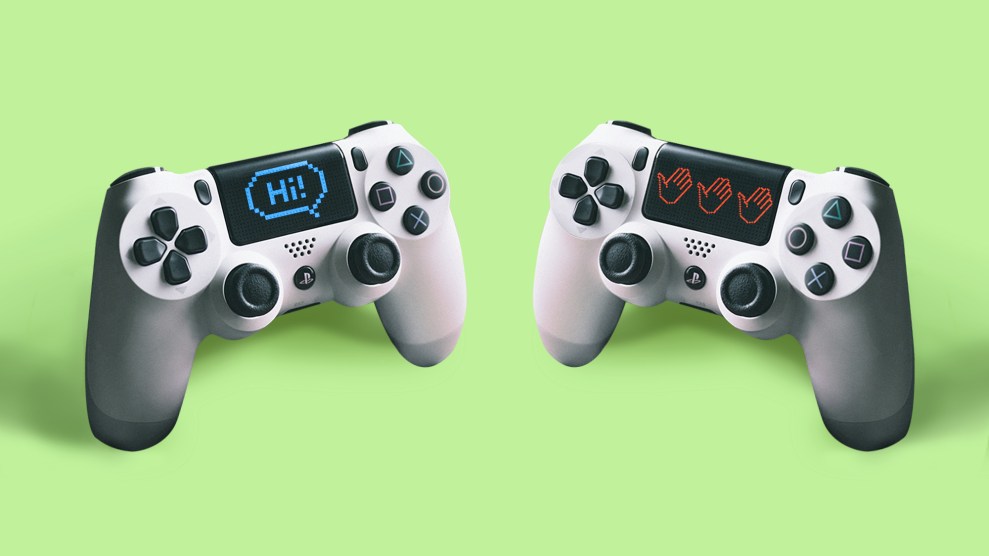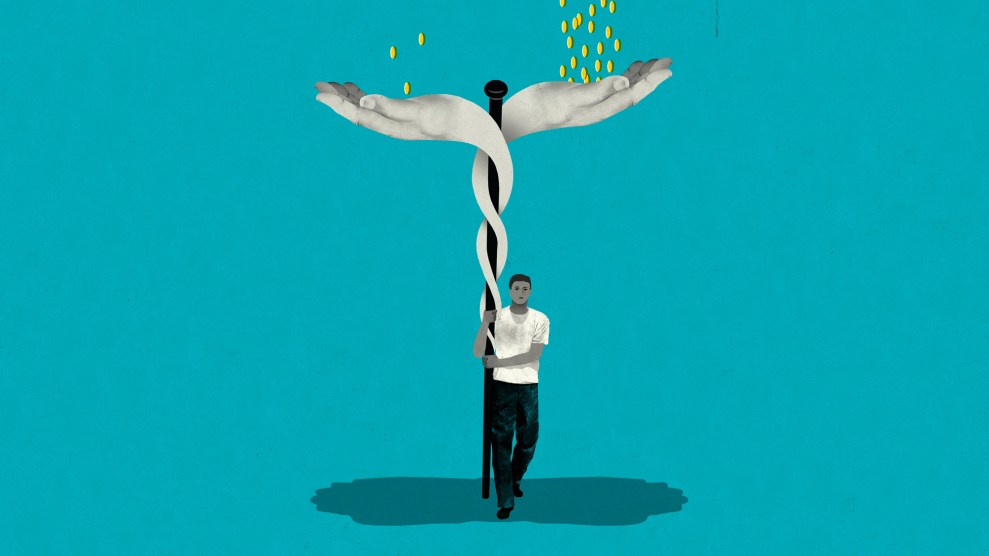
Mother Jones; Unsplash; Getty
Like many students in the fall of 2020, the pandemic threw a wrench into LC Newman’s university plans—not just socially, but physically. After a Covid infection, Newman, then a college sophomore in Tucson, Arizona, never got better. Her symptoms were wide-ranging: her heart felt like it was pounding out of her chest; she developed heat intolerance. That, and repeat infection concerns, led her to self-isolate from the few people she’d regularly spent time with.
Newman then faced a challenge beyond getting health care: loneliness. “Those friendships kind of dwindled away—because I no longer drive, I no longer felt really comfortable leaving my house much,” Newman said. “When you’re just sitting at home, your thoughts can kind of spiral.”
What did enter her life was long Covid, in which new symptoms persist—or develop—long after an infection. The only way to avoid long Covid is to avoid Covid entirely: research suggests that the risk of long-term symptoms increases with each infection, even in asymptomatic cases. Treatment options are limited for a few reasons, among them that long Covid is fairly new, and a condition it’s been compared to—myalgic encephalomyelitis/chronic fatigue syndrome—has not always been taken seriously.
Dr. Sindhu Mohandas, an infectious disease specialist and long Covid researcher with the Children’s Hospital Los Angeles’ Long Covid Recovery Care clinic, says that common symptoms include severe fatigue, brain fog, and post-exertion malaise, in which other symptoms worsen after physical or mental strain, a problem for everything from participating in sport to holding an extended conversation. “A lot of the child’s life during adolescence is around school and social interaction, and the symptoms of long Covid affect both of these,” Mohandas told me. “Social activities can consume a lot of energy and lead to this crash where they no longer are in a situation to do any of these things.”
The connection between chronic illness and loneliness is well established, but long Covid has thrust it into the spotlight. In 2022, British researchers found that 16-to-24-year-olds with chronic illness are likelier to experience chronic loneliness. Perhaps unsurprisingly, there’s also a link between chronic illness and mental health conditions: a May 2020 study found that children living with a chronic illness by age 10 developed more severe mental health-related symptoms than their peers by their early teens.
Despite some popular narratives, Covid infections are not harmless for children, adolescents or young adults. After an acute infection, young people like Newman can still develop long Covid and related conditions. After three months, a July Pediatrics article found, more than a sixth of children and adolescents have at least one persisting symptom. A CDC estimate puts the proportion of American adults with long Covid at around 6 percent.
Developing a chronic illness while attending university can pose its own challenges. “You’re also trying to navigate social dynamics, life plans, and adulting,” says Monica Blied, a clinical psychologist and founder of Faces of Health.
After becoming chronically ill, some young people turn to the internet to build community and learn more about their condition and symptoms. Others socialize with informal groups based on a common interest—gaming on Twitch, joining a virtual language practice group, talking about a favorite show on Discord—which can accommodate their varying abilities, which can change day to day and even hour to hour.
“Emotional support might be the way that these online communities can help reduce feelings of loneliness,” David Russell, a sociology professor at Appalachian State University, told me.
Russell was the lead author of a 2022 study that looked at the role of online communities in the lives of people with long Covid. Participants shared experiences of having their health dismissed, and online forums emerged as places where they could connect with others who had been told their symptoms were in their heads. These communities, Russell’s study noted, can also help people with long Covid better understand their new reality.
Not all such groups were without their flaws. Some shared pseudoscience that hadn’t been fact-checked—a hard task when most people involved are sick. What makes these online communities unique, though, is the option to take a step back without commotion if they’re not serving their members.
“Being aware and checking in with yourself is vital so that each person has an individual journey,” said Blied, who lives with lupus.
As her character ran across a garden filled with a myriad of flowers, during a stream of the video game Animal Crossing: New Horizons, Newman talked about creating a chatbot that would help explain POTS, or postural orthostatic tachycardia syndrome, a blood circulation disorder triggered by her Covid infection.
“I was kind of just existing with POTS before my gaming channel,” Newman said. “Now, I have a Snapchat group of all my Animal Crossing girls.” She says the friendships she’s been able to build through Animal Crossing have changed her life.
Covid made the world of Animal Crossing, the hugely popular series of “social simulation” games, a lifeline for many. Players build a village, connect with others, and participate in open-ended activities, all of which lend themselves well to people whose in-person social lives have been cut down. An April 2022 study suggested that the game, even for those who were not chronically ill, helped people meet basic psychological needs during lockdowns.
Around half of Newman’s Animal Crossing circle are chronically ill, living with conditions like endometriosis or polycystic ovary syndrome. Newman said she can casually mention her symptoms without the questioning she’s faced from people who aren’t chronically ill.
“They know that you’re not lying,” Newman said. “It helps make closer friendships, because you know that they’re not low-key doubting that.”
Invalidation of chronic illness symptoms can be common, even by healthcare professionals. Friends and families of youths living with long Covid, Dr. Mohandas said, “should try and support and empathize more with this condition.”
Post-infectious diseases and disabilities are nothing new. In the United States, for much of the 20th century, thousands of young polio survivors contracted lasting symptoms and disabilities. But unlike the US of the ’50s, today’s world is more connected than ever through the internet, helping people feel less alone.
This article is supported by Solutions Journalism Network’s HEAL fellowship.













